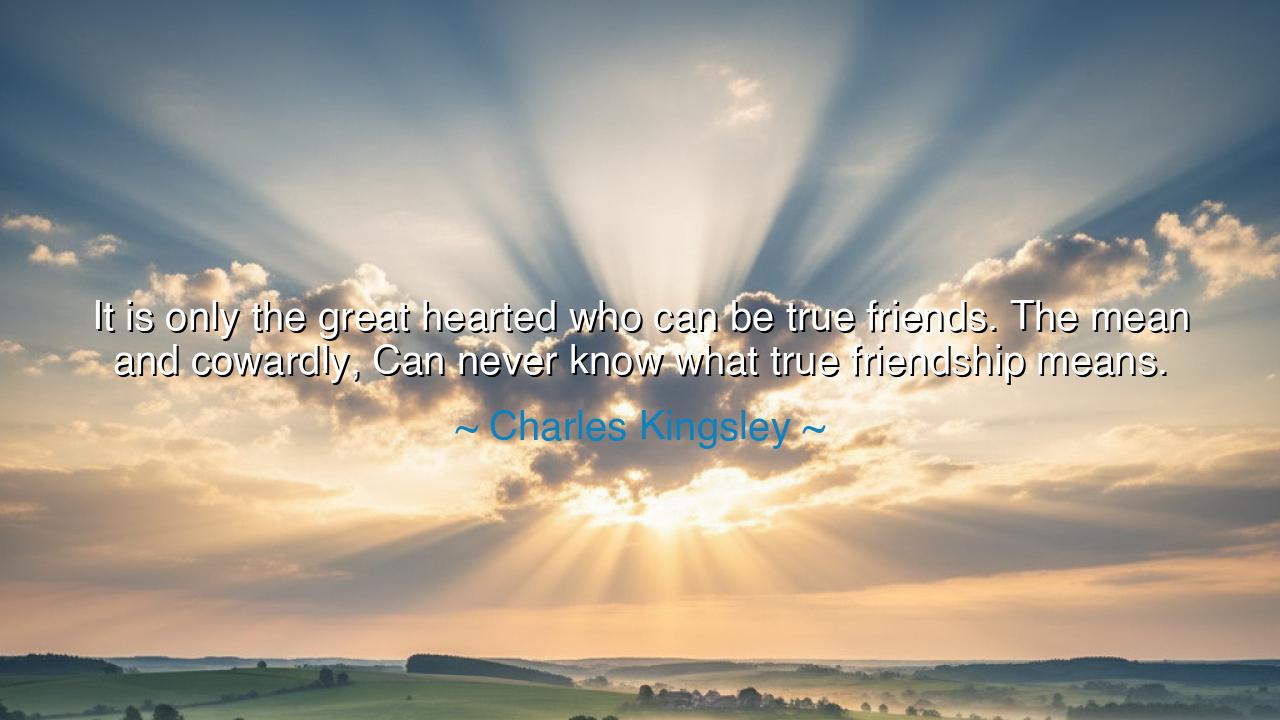
It is only the great hearted who can be true friends. The mean
It is only the great hearted who can be true friends. The mean and cowardly, Can never know what true friendship means.






“It is only the great-hearted who can be true friends. The mean and cowardly can never know what true friendship means.”
Thus spoke Charles Kingsley, the English clergyman, novelist, and moral philosopher whose words flowed from both the pulpit and the soul. In this saying, Kingsley pierces to the very core of what friendship demands: greatness of heart, courage, and nobility of spirit. For friendship, he reminds us, is not a pastime for the weak or the selfish—it is a bond forged in strength, sustained by virtue, and sanctified by loyalty. The mean and cowardly, bound by fear and smallness of spirit, can never taste its depth, for friendship requires not the trembling of hearts, but their fearless giving.
The origin of this thought may be traced to Kingsley’s lifelong fascination with character and moral courage. Living in the nineteenth century—a time of great social upheaval, where faith and conscience were often tested—he saw that true companionship was built not on convenience or comfort, but on bravery of love. His writings often echoed the ideals of chivalry, that ancient code of honor where courage and compassion walked hand in hand. For to be a true friend, Kingsley believed, one must possess a knightly heart: one that dares to stand by another in adversity, that defends truth even when it costs much, that forgives, protects, and uplifts without expectation of reward.
The meaning of his words is clear: only those who are great-hearted—that is, generous in spirit, steadfast in loyalty, and fearless in love—can sustain the sacred trust of friendship. Such souls do not measure affection by gain, nor shrink from hardship when their friend is in distress. They give without counting the cost, forgive without being asked, and love without end. The mean—those who are selfish, jealous, or small in spirit—cannot do this, for their hearts are narrow, and friendship demands breadth. The cowardly, too, cannot know it, for they flee when the winds of trouble blow, or hide behind excuses when truth calls for defense. Friendship, like heroism, belongs to the brave.
History offers countless examples of this truth. Consider the friendship between Jonathan and David, the prince and the shepherd of ancient Israel. When envy might have divided them—when Jonathan’s father, King Saul, sought David’s life—Jonathan stood by his friend at great peril to himself. He warned David of danger, spoke truth to power, and risked a kingdom for loyalty. His was a great heart, capable of sacrifice, unmarred by fear or selfishness. The mean and cowardly would have chosen safety or flattery, but Jonathan chose love and truth. And though death separated them, their bond became eternal—a model of friendship that outlived their mortal days.
The great-hearted, as Kingsley teaches, are not great by birth or wealth, but by virtue. Their strength is not in the sword, but in the soul. They possess courage, not only in battle but in compassion; they are brave enough to forgive, bold enough to be honest, and humble enough to love without pride. The mean-hearted, by contrast, shrink from giving and resent another’s joy; their love is tainted by envy, their loyalty by calculation. Such hearts cannot contain the vastness that friendship requires. True friendship, therefore, is not found among the small of spirit, but among those who live with largeness of heart—who see in their friend not a rival, but another self.
Let us not mistake, then, the simplicity of Kingsley’s words for ease of practice. To be great-hearted is no light task—it is to live with courage when fear whispers retreat; to remain loyal when the world turns away; to love when love demands sacrifice. The cowardly will never know this joy, for they live behind walls built of self-interest. But the noble heart, open and fearless, finds in friendship a reflection of the divine—the beauty of two souls walking together in truth.
Let this be the lesson to those who seek lasting bonds: cultivate greatness within, and you will attract greatness without. Do not seek friends among those who flatter, nor count as companions those who desert you in hardship. Rather, be yourself the friend you wish to have: steadfast, generous, and brave. When your friend stumbles, lift him; when he errs, forgive him; when he suffers, stand beside him in silence if words cannot heal. For in doing so, you become what Kingsley called great-hearted—one who gives meaning to the sacred word friendship.
Thus, the wisdom of Charles Kingsley endures like a flame against the cold winds of selfishness: “It is only the great-hearted who can be true friends. The mean and cowardly can never know what true friendship means.” To live by this truth is to rise above the smallness of envy and the timidity of fear, and to walk the path of those rare souls whose hearts are vast enough to love without limit, and strong enough to remain faithful unto the end. For friendship is not a gift we receive—it is the noble labor of the brave and generous heart.






AAdministratorAdministrator
Welcome, honored guests. Please leave a comment, we will respond soon